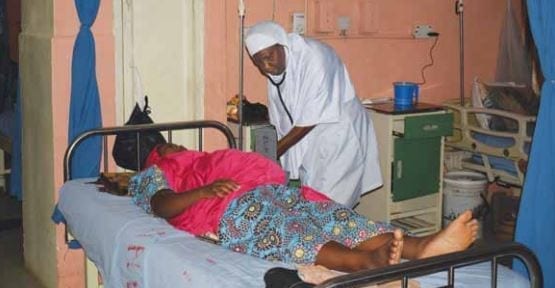A new Solidarity Center report, “Working for Peace in North-East Nigeria: A Challenge for Nigerian Trade Unions,” outlines the devastating toll of Boko Haram violence on people living in northeast Nigeria, in particular on civil servants and their families, and how the labor movement will be essential to responding to the aftermath of the crisis and rebuilding for sustainable development and peace.
The report, with accompanying worker testimonials, was launched Tuesday at a 50-person event in Abuja, Nigeria’s capital. featuring three workers victimized by Boko Haram; Solidarity Center, Borno-based trade union partners; representatives of Nigeria’s National Labor Congress (NLC)—including President Ayuba Wabba; Public Services International (PSI); the Trade Union Congress (TUC); the Organization of Trade Unions of West Africa (OTUWA), as well as the press.
“We have lost more than two thousand workers—teachers, local government workers, health workers,” said Wabba, who pointed to lack of good governance as the root cause of conflict.
“We must work assiduously to try to address issues of human and trade union rights,” he continued.
Three years of sustained work by NLC-affiliated public-sector unions in the region preceded the report’s publication. The unions that represent teachers and hospital workers, among groups specifically targeted by Boko Haram militants, were able to document and begin to address the economic and psycho-social impacts of violence on their members and the community at large. “As integral members of their communities,” the report states, “union members are well-positioned to assess the local situation, understand the needs of community members and communicate this essential information to better facilitate the post-conflict rebuilding process.”
Report recommendations include that the government of Nigeria follow principles established by ILO Recommendation 205 to work in coalition with trade unions and employers in creating long-term solutions for a sustainable and inclusive economy, including bringing back family-sustaining jobs and helping institutions such as schools and hospitals recover and rebuild.

